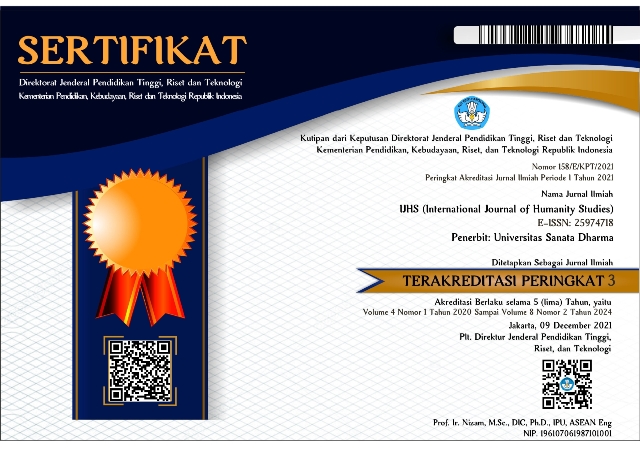ECOLINGUISTIC STUDY OF CONSERVATION NEWS TEXTS IN INDONESIAN MASS MEDIA
Abstract
Keywords
Full Text:
PDFReferences
Al Gayoni, Yusradi Usman. 2012. Ekolinguistik. Jakarta: Pang Linge.
Al-Sharabi, A., Ibrahim, N., & Nor, N. F. M. (2011). Representation Of Nojouds EarlyMarriage: A CDA Of Online English-Language Yemeni Newspapers. GEMA Online Journal of Language Studies, 11(1).
Bolte, S., & Keong, Y. C. (2014). The Refugee Swap Deal in Malaysian Online News Reports: Ideology and Representation. GEMA Online Journal of Language Studies, 14(2).
Crystal. 2008. A Dictionary of Languistics and Phonetic. 6th edition. United Kingdom; Blackwell Publishing
Dr, J., & Chr, J. (1996). Language, ecology and truthdialogue and dialectics. na.
Fill, Alwin dan Peter Mhlhusler. 2001. The Ecolinguistics Reader Language, Ecology, and Environment. London: Continuum.
Gibbons, Michael. T. (ed). 2002. Tafsir Politik Interpretasi Hermeneutis Wacana Sosial-Politik Kontemporer (Ali Noer Zaman). Yogyakarta: Qalam.
Haugen, Einar. 1972. The Ecology of Language. dalam Alwin Fill dan Peter Mhlhusler (ed) The Ecolinguistics Reader Language, Ecology, and Environment. London: Continuum.
Kesuma, Deli. 2015. Keterancaman Leksikon Ekoagraris dalam Bahasa Angkola/Mandailing: Kajian Ekolinguistik. Jurnal Kajian Linguistik, Program Studi Linguistik FIB USU, Tahun ke-12, No.1, Februari 2015, halaman 54-76. ISSN 1693-4660.
Kesuma, Tri Mastoyo Jati. 2007. Pengantar (Metode) Penelitian Bahasa. Yogyakarta: Caravatibooks.
Kress, Gunther. 2010. Bahasa, Citra, Media. Terjemahan Language, Image, Media, Ikramullah Mahyudin. Yogyakarta: Jalasutra.
Kridalakasana, Harimurti. 1989. Pembentukan Kata dalam Bahasa Indonesia. Jakarta: Gramedia.
Lind, Anna Vibeke and Jeppe Bundsgaard (eds). 2000. Dialectical Ecolinguistics Three Essays for the Symposium 30 Years of Language and Ecology in Graz December 2000. Austria: Univerisity of Odense Research Group for Ecology, Language and Ecology.
Mahsun. 2005. Metode Penelitian Bahasa: Tahapan Strategi, Metode, dan Tekniknya. Ed. Revisi. Jakarta: Raja Grafindo Persada.
Mbete, Aron Meko. 2002. Ungkapan-Ungkapan dalam Bahasa dan Fungsinya dalam Melestarikan Lingkungan. Linguistika. Vol. 9: No. 17. Program Studi Magister dan Doktor Linguistik Universitas Udayana, September 2002, halaman 174-186.
Mbete, Aron Meko. 2009. Selayang Pandang Tentang Ekolinguistik: Perspektif Kelinguistikan yang Prospektif. Bahan Untuk Berbagi Pengalaman Kelinguistikan Dalam Matrikulasi Program Magister Linguistik Program Pascasarjana Universitas Udayana, 12 Agustus 2009.
Moleong, Lexy J. 2007. Metodologi Penelitian Kulitatif. Bandung: Remaja Rosdakarya.
Peraturan Rektor Universitas Negeri Semarang Nomor 22 Tahun 2009 tentang Universitas Negeri Semarang sebagai Universitas Konservasi.
Peraturan Rektor Universitas Negeri Semarang Nomor 27 Tahun 2012 tentang Tata Kelola Kampus Berbasis Konservasi.
Peraturan Menteri Riset, Teknologi, dan Pendidikan Tinggi Republik Indonesia Nomor 49 Tahun 2016 tentang Statuta Universitas Negeri Semarang. Semarang: Universitas Negeri Semarang.
Peraturan Rektor Universitas Negeri Semarang Nomor 6 Tahun 2017 tentang Spirit Konservasi Universitas Negeri Semarang.
Rencana Pembangunan Jangka Menengah Nasional 2015-2019.
Rokhman, Fathur dan Surahmat. 2016. Politik Bahasa Penguasa. Jakarta: Kompas.
Rustono. 1999. Pokok-Pokok Pragmatik. Semarang: IKIP Semarang Press.
Stibbe, Arran. 2010. Ecolinguistics and Globalisation. Dalam Nikolas Coupland (ed) The Blackwell Handbook of Language and Globalisation. London: Blackwell.
Sudaryanto. 2015. Metode dan Aneka Teknik Analisis Bahasa: Pengantar Penelitian Wahana Kebudayaan secara Linguistis. Yogyakarta: Duta Wacana University Press.
Sugiyono. 2012. Metode Penelitian Pendidikan Pendekatan Kuantitatif, Kualitatif, dan R & D. Bandung: Alfabeta.
Suhandang, Kustadi. 2004. Organisasi, Produk, dan Kode Etik Jurnalistik. Bandung: Yayasan Nuansa Cendekia.
Vo, D. D. (2013). Language and Ideology In English And Vietnamese Business Hard News Reporting-A Comparative Study. 3L: Southeast Asian Journal of English Language Studies, 19(2).
Wijana, I Dewa Putu. 2010. Pengantar Semantik Bahasa Indonesia. Yogyakarta: Program Studi S2 Linguistik Fakultas Ilmu Budaya UGM Yogyakarya bekerja sama dengan Pustaka Pelajar.
DOI: https://doi.org/10.24071/ijhs.v1i2.686
Article Metrics
Abstract view : 4380 timesPDF view: 2463 times
Refbacks
- There are currently no refbacks.
Copyright (c) 2018 Tommi Yuniawan
Indexed and abstracted in:
IJHS Sinta 3 Certificate (S3 = Level 3)
International Journal of Humanity Studies (IJHS) has been nationally accredited Sinta 3 by the Ministry of Education, Culture, Research and Technology of the Republic of Indonesia based on the decree No. Surat Keputusan 158/E/KPT/2021. Validity for 5 years: Vol 4 No 1, 2020 till Vol 8 No 2, 2024

This work is licensed under CC BY-SA.
Creative Commons Attribution-ShareAlike 4.0 International License.
p-ISSN: 2597-470X (since 31 August 2017); e-ISSN: 2597-4718 (since 31 August 2017)
International Journal of Humanity Studies (IJHS) is a scientific journal in English published twice a year, namely in September and March, by Sanata Dharma University, Yogyakarta, Indonesia.
Note: The opinions expressed in this publication are those of the authors. They do not purport to reflect the opinions or views of the editorial team or publishers.

















